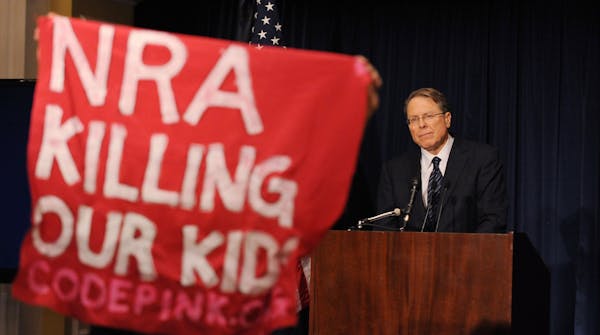Moments after the shots were fired, a single topic dominated social media: the massacre of schoolchildren in Newtown.
Millions turned to Twitter and Facebook, many searching for facts on rapidly churning newsfeeds, some seeking solace. Others pushed their passions by starting petitions advocating both sides of the gun debate and instigating arguments about how we treat people who are mentally ill.
While the nation was still reeling, social media proved to be a powerful, unfiltered way to cope with a tragedy so horrific that it reminded some people of Sept. 11, 2001. But this time, the expressions of grief and outrage could spread beyond the dinner table and capture a global audience -- almost instantly.
This unprecedented online outpouring allowed people to respond while their emotions were still inflamed. It also empowered millions of people to speak out for both gun control and gun rights.
"[Social media] has become the public square, the place people visit to express how they're feeling," said Allison Fine, who studies social media and social change at the New York City-based think tank Demos. "We don't walk out onto the street to do this now. We click on the Facebook tab."
That's exactly what happened on Friday as the National Rifle Association held a news conference to respond to calls for more stringent gun laws. Twitter and Facebook were roiling with responses to what was being said the moment the NRA's Wayne LaPierre began to speak.
Violence, then viral heartache
As news of the Newtown shooting broke, postings of shock and disbelief flooded Twitter. Facebook feeds morphed from mundane status updates to heart-wrenching memorials to those who died. Multiple photographs of slain teacher Victoria Soto went viral, garnering hundreds of thousands of "likes." A photo collage of the 20 murdered children was "liked" by more than 330,000 people in less than a week.
"Everything is so instant, so in the moment," said Lanae Paaverud of Shakopee, who first heard about the shooting on Twitter that morning, then turned to her own account to share her sorrow. "It seems to hit you in the face quicker."
That immediacy was evident in virtual vigils and memorial Facebook pages that appeared online within hours. It brought the horror of the event closer to people nowhere near Connecticut -- and total strangers sprang to action.
Megan Berg, of White Bear Lake, latched on to a Twitter campaign to perform random acts of kindness and then tweet them with the hashtags #20acts and #26acts, references to those killed at the school.
"You lose hopefulness, then you see these good things and realize there still is a lot of good out there," she said.
Anger expressed, too
But the exchange of tweets and posts wasn't all about grieving and virtual flowers. Anger rippled across the Internet as some people pushed for gun control while others voiced concerns about restricting the Second Amendment.
A citizen petition on the White House website calling for more gun control has amassed nearly 200,000 signatures. Another citizen petition calling for the president to support gun owners' rights has drawn more than 55,000.
"Twitter and social media in general serve as a catalyst for public discussion," said Seth Lewis, an assistant professor at the University of Minnesota who studies social media. "The public is venting and expressing their feelings in a way that almost gets out ahead of the news cycle."
Guns, not condolences, dominated the discussion. Thirty percent of the conversation on Twitter and blogs was about gun laws, according to a study released on Thursday by the Pew Research Center. That exceeded expressions of sympathy and prayers, which made up 25 percent of the discussion on Twitter.
The drumbeat of tweets and online posts was a prelude to President Obama and congressional leaders pushing for gun-law changes.
Roxanne Prichard of St. Paul said she transformed her Twitter account into a call for more gun control because her grief compelled her to act. "With a tornado or a natural disaster, as long as buildings are built to code, nothing can really be done," she said. "But with this type of crime or disaster, it's a product of our society and we have a duty to do more to protect people."
Fine, the social media advocacy expert, said the online cacophony, a digital transcript of the public's conscience in the days after the shooting, ensures that the topic will not be easily forgotten. All it takes is a link back to one of the poignant photos or anguished responses to remind politicians about the public outcry.
"You can't ignore this one," Fine said. "It's too big. It's too painful."
Katie Humphrey • 612-673-4758
Tensions between Beijing and Washington are the biggest worry for US companies in China, report says

